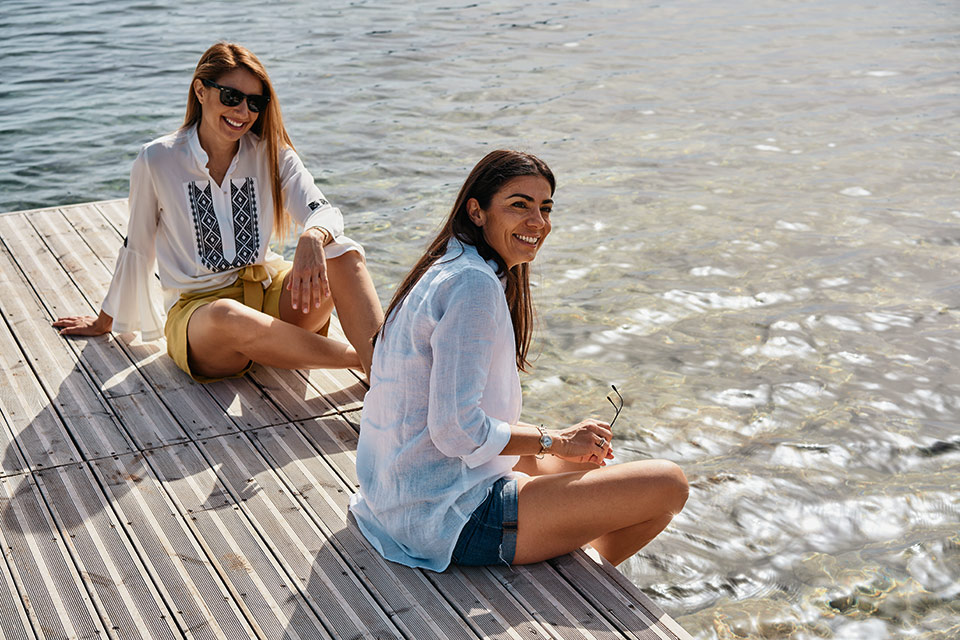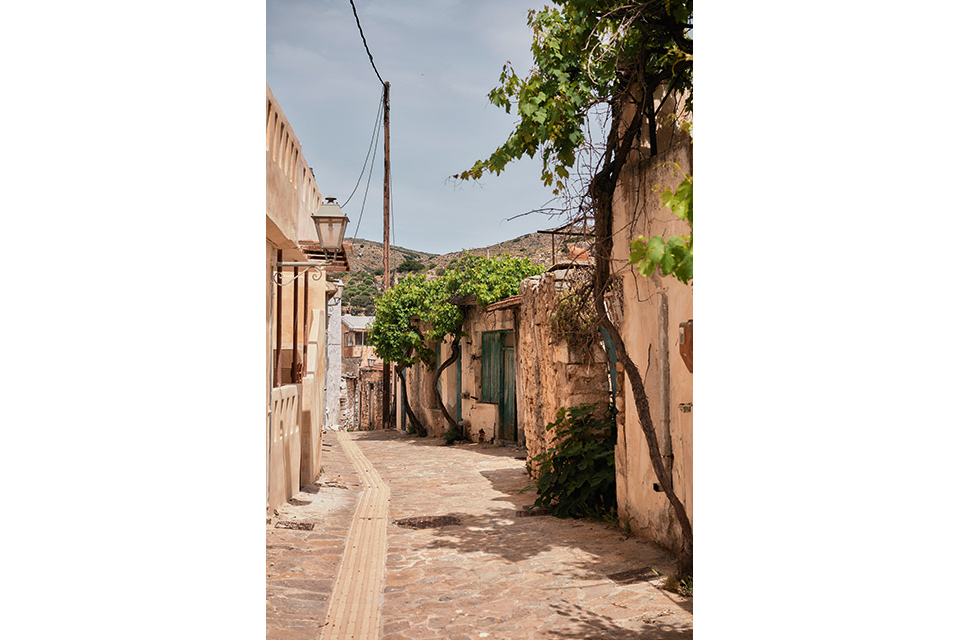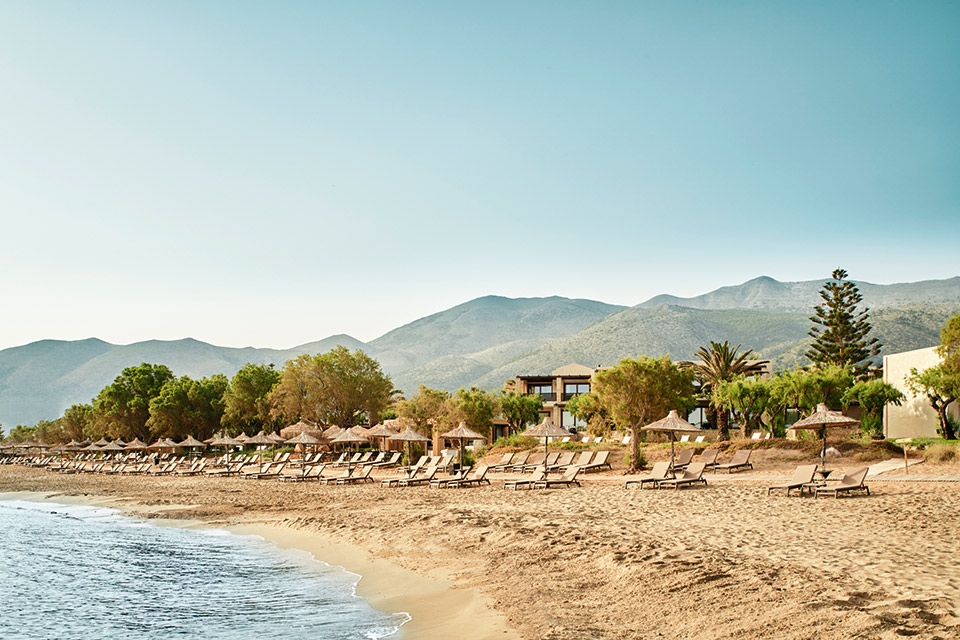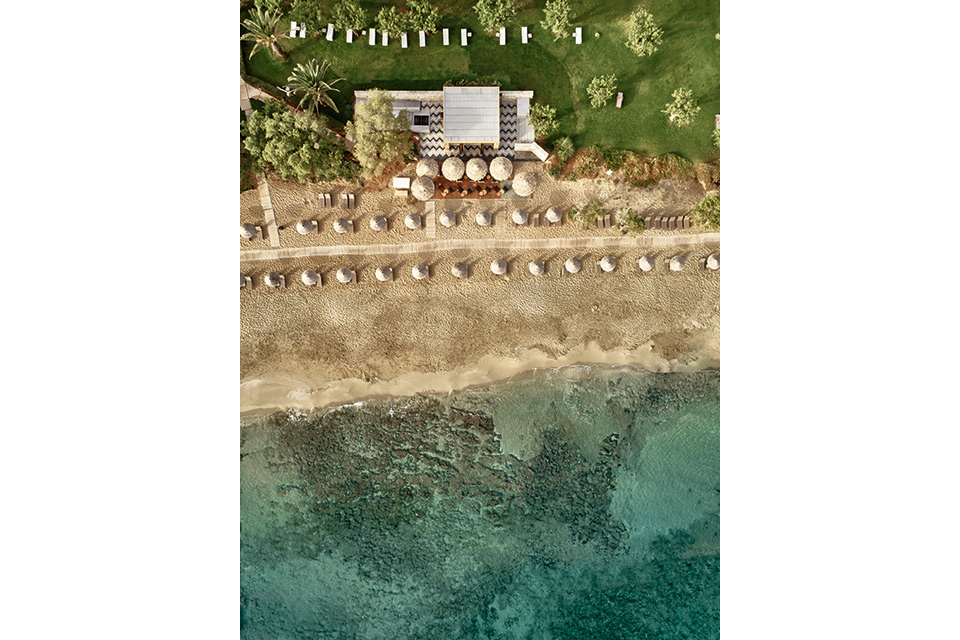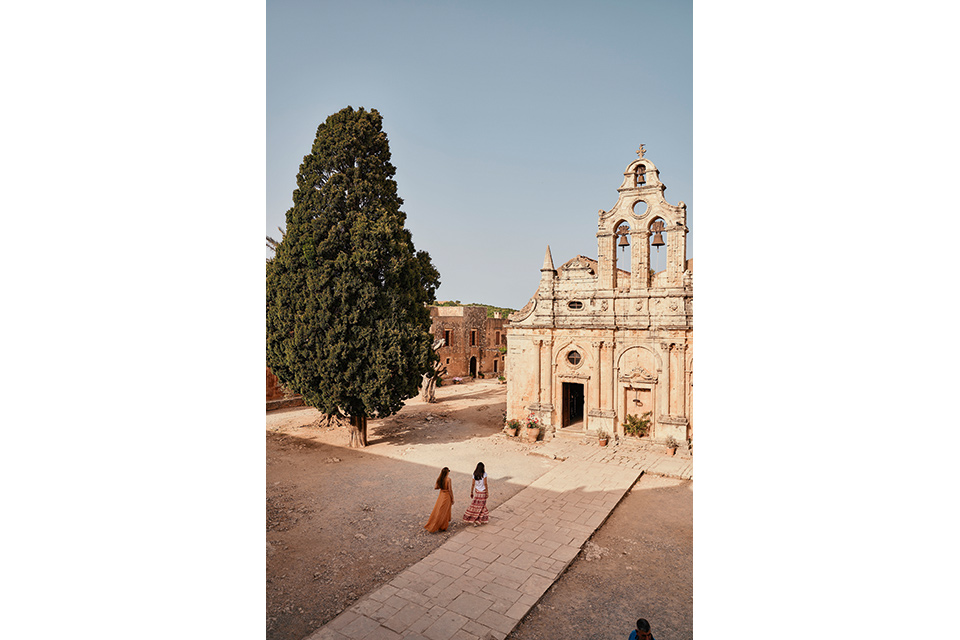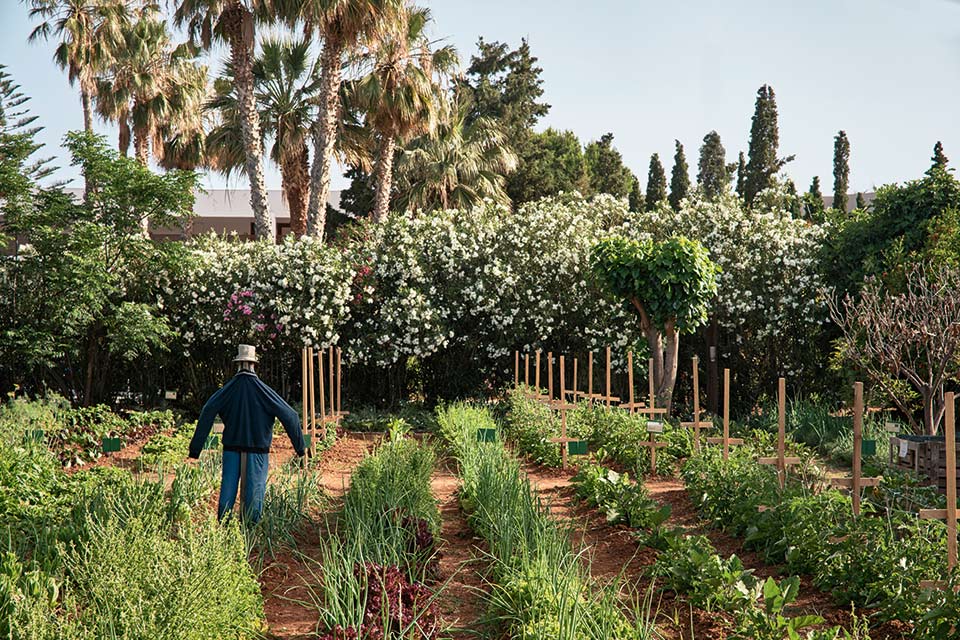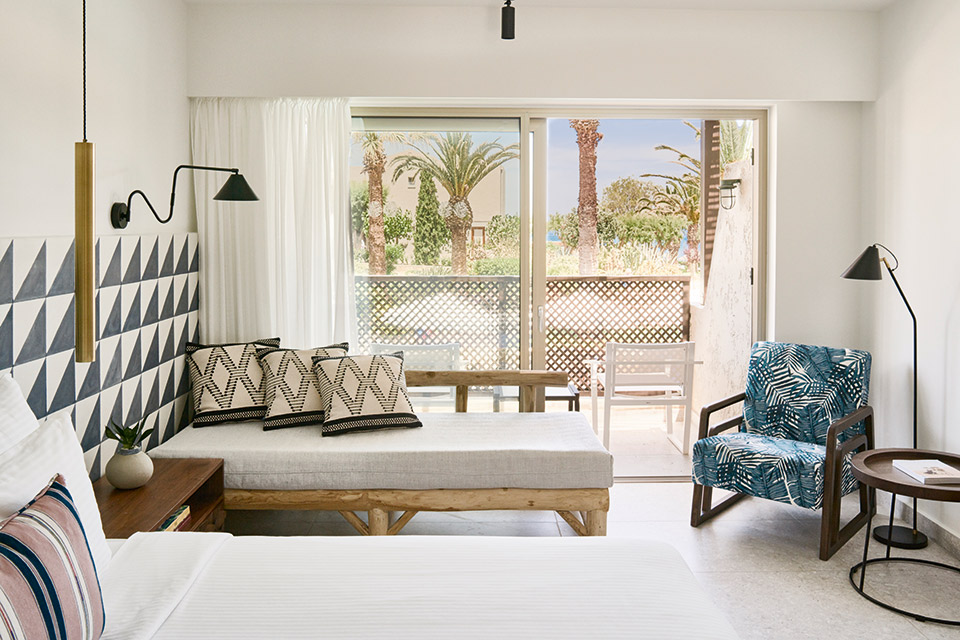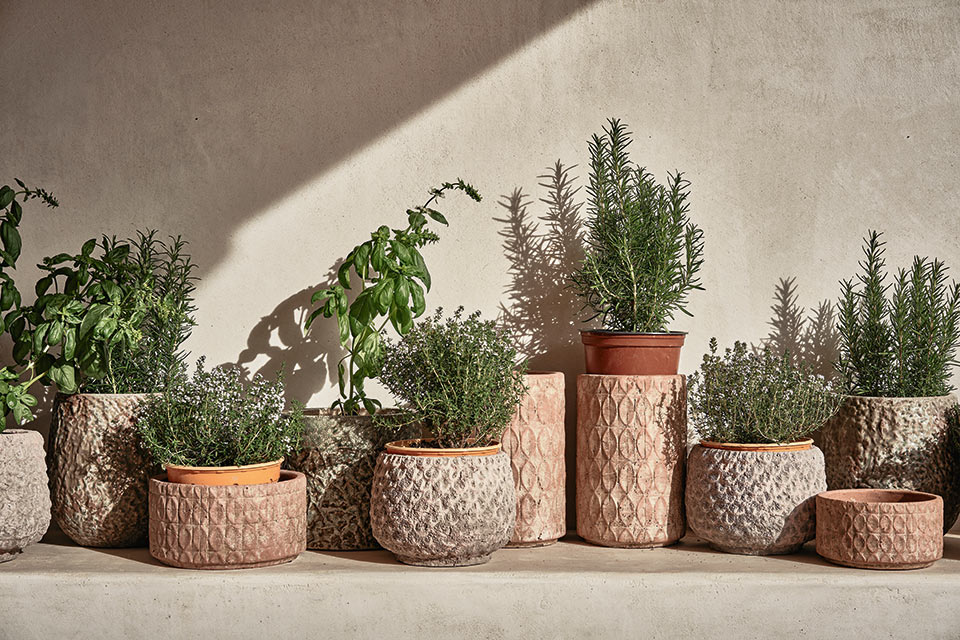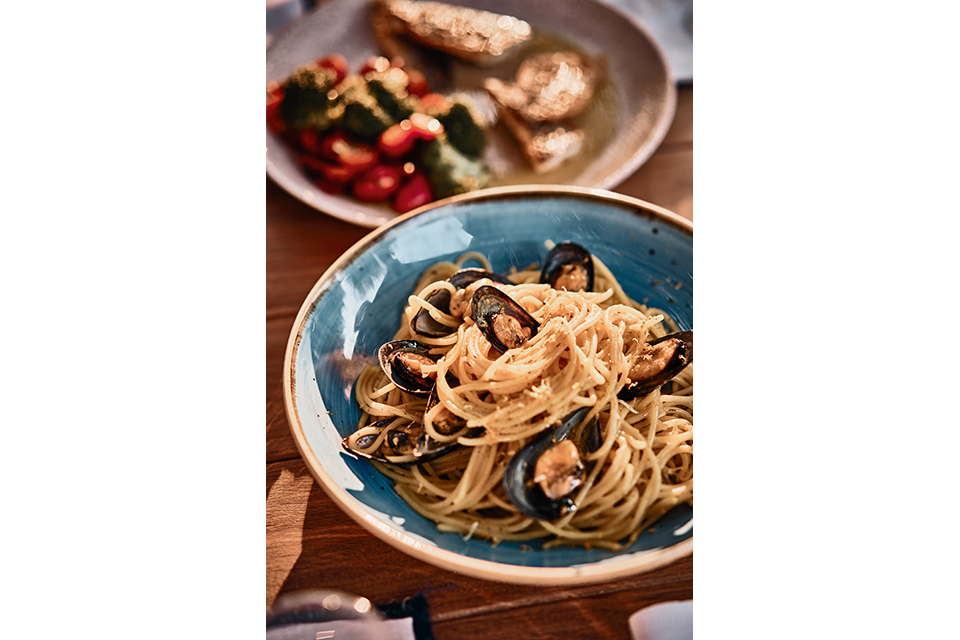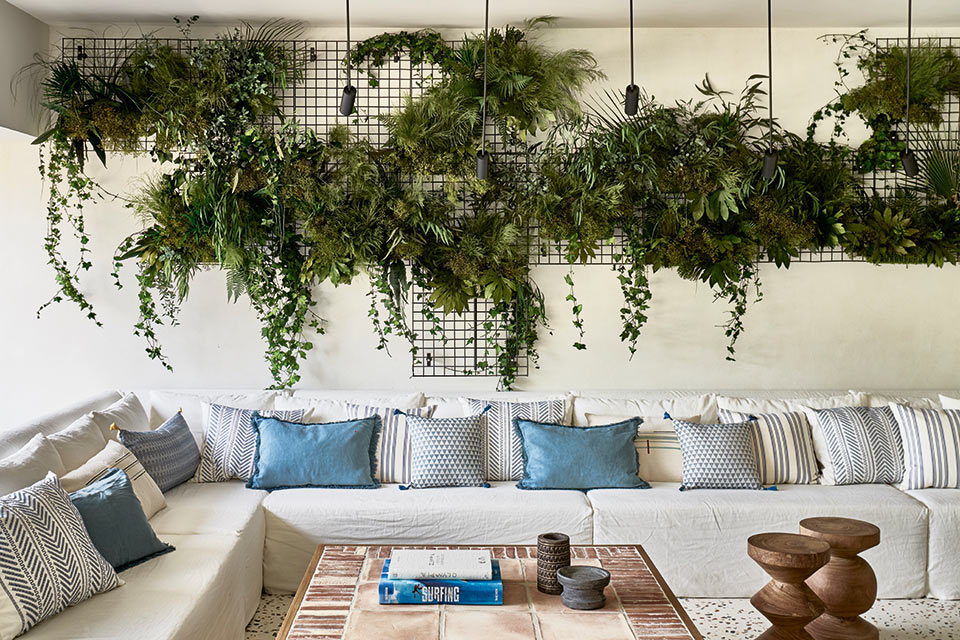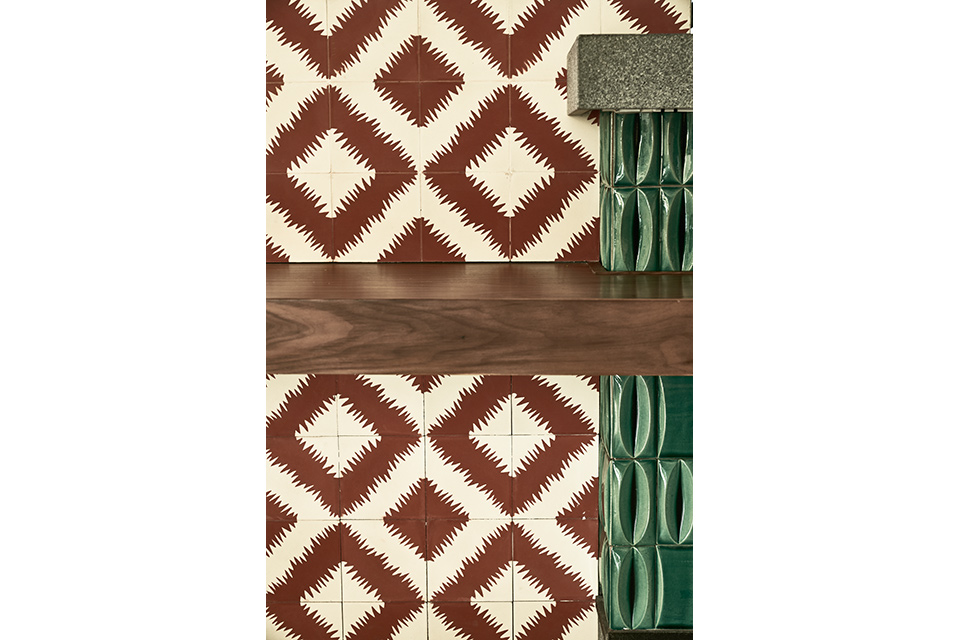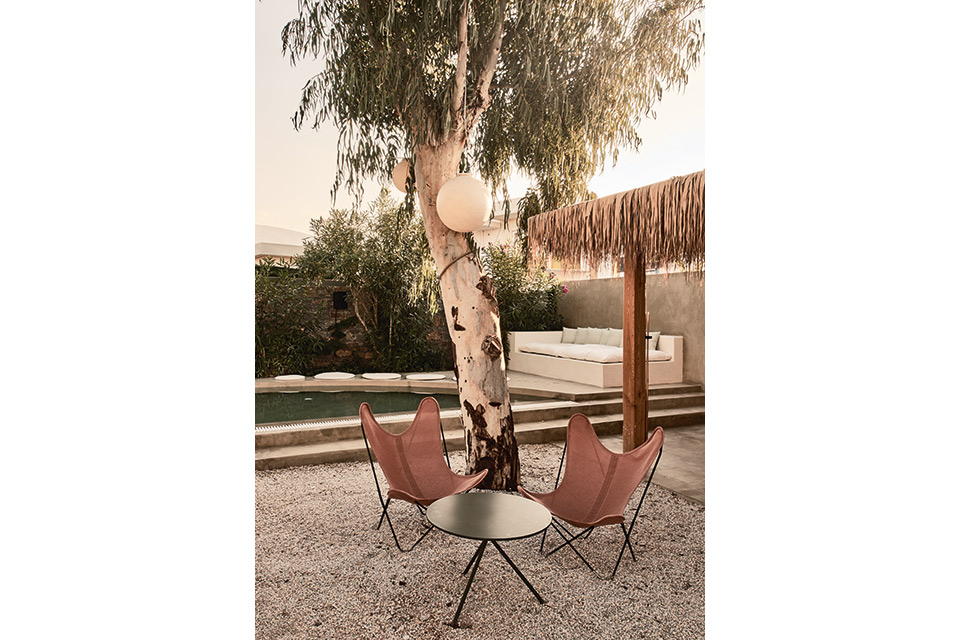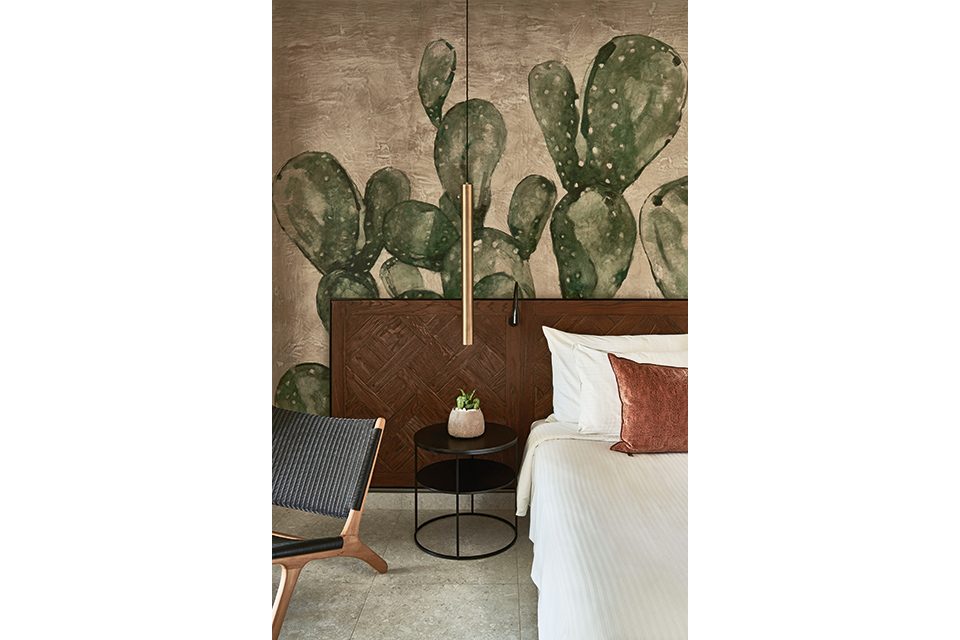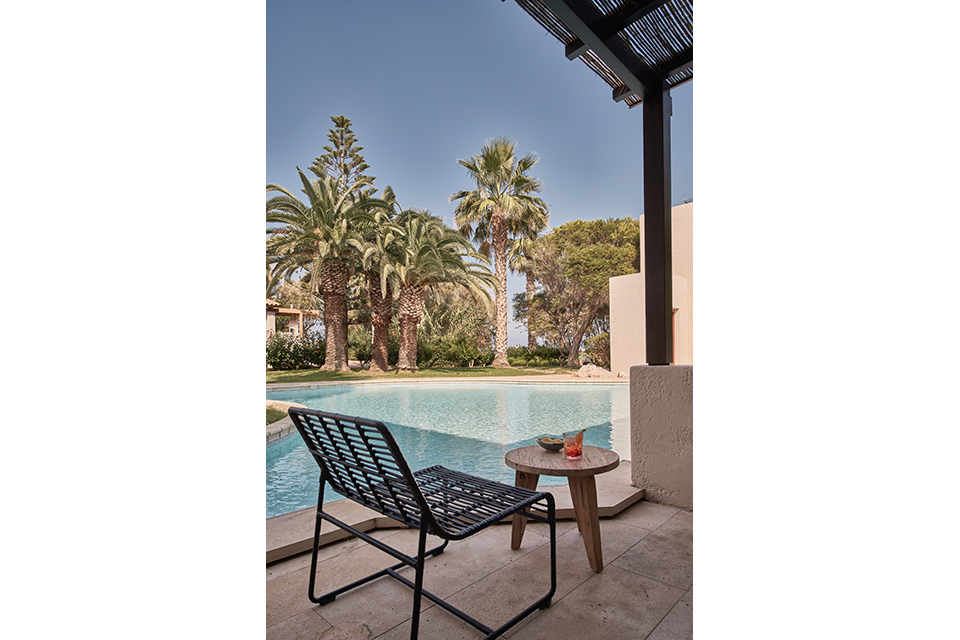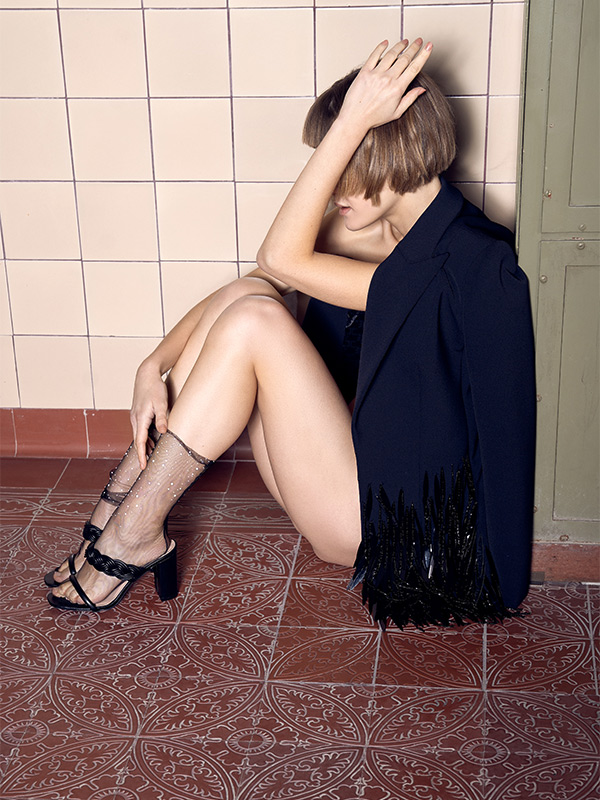Some call it fate, others family heritage: In any case, contrary to the original idea, Agapi and Costantza Sbokou ended up in the hotel industry, where their father had already set the best example. At Cretan Malia Park, the sisters combine everything that is important to them. And in addition to sustainability, design, tradition and locality, this also means one thing: warmth.
FACES: How did you get into the hotel industry?
Agapi and Costantza Sbokou: We both grew up in hotels. All our childhood memories are anchored there. However, the fact that we would take over the family business was never an issue. Our father wanted us to study what we loved and pursue a career in the field we chose. So we never felt bound to our destiny – even if it did eventually take hold of us.
F: How would you describe your hotel in one sentence?
AS: The Cretan Malia Park is engaging – on many levels. Nature, design, food, people.
F: How long did the process take from the idea to the concept to the finished hotel?
CS: We started with brand positioning, which also involved many of the resort’s employees. This helped us to put into words the direction we wanted to take. It was also a briefing for our talented architect Vana Pernari and everyone else involved in the process: Photographers, marketing experts and our own staff. This exercise helped us to stay focused and be consistent with every step. The design and renovation were completed in two years, and that’s because we only built during the winter.
F: Why should we definitely stay at Cretan Malia Park?
AS: The Cretan Malia Park is not just a nice hotel to spend a few relaxing days. The hotel and its people have a special aura: it is like a big hug that is preserved, a beautiful retreat with a focus on slow luxury, sustainability, design and authenticity. The modern interpretation of Cretan hospitality embraces a design that respects the culture and heritage of the island and emphasizes the mindful lifestyle and local culinary traditions to create a timeless environment for guests to connect with the natural surroundings.
CS: Sustainability feels like we are returning to our roots and not following a trend. Guests here feel inspired by the way we preserve our heritage and the rhythm of daily life – by the Greek-influenced design, art and architecture ethos that is reflected in every detail of the resort; by the use of locally sourced ingredients in traditional Cretan recipes, cultural events and children’s programs, by the local botanical landscape and our large organic garden from which we source our ingredients for our menus, by our commitment to employing local staff and giving back to nature and the local community. We embrace mindfulness and the need for people to improve their lives.
F: What do hoteliers need to think about that others don’t?
AS: Hotels are all about people. We employ and accommodate many people. That makes our job exciting, but also confusing. It takes a lot of emotional intelligence to reconcile different characters and nationalities, preferences and trends. But we find it very inspiring. We always say that it’s all about being surrounded by like-minded people – and that’s what creates this great vibe. It doesn’t matter whether they work here or enjoy their vacation or even work for us abroad – as is the new trend. They have similar values.
CS: The hotel industry is an influential business with a high environmental impact. We are very aware of this as a company and introduced environmental guidelines even before we were founded in the early 1990s. Today, protecting our environment and giving nature back to our society form the core of our philosophy.
F: What are you worrying too much about?
AS & CS: Time – there never seems to be enough of it for all the things we want to do.
F: What are you like as bosses?
AS: Challenging, but hopefully also inspiring for our employees.
CS: Straightforward, passionate, determined.
F: What qualities does a good host need?
AS : Genuine cordiality – that’s quite natural for us Cretans. Understanding who our guest is and effortless attention to detail. Every space should be curated to reflect our aesthetic. Every experience should have our attention to show who we are. And yet everything should be done in such a way that it radiates an effortless, almost natural feeling. All of this is an acquired talent.
F: Which guests do you like best?
CS : A dream guest is anyone who leaves a place fascinated by its culture and its people. Someone who travels the world but comes to Crete and Cretan Malia Park and sees beyond the obvious. I love it when they tell us how they feel when they stay with us. I also love it when they add something. We have had guests who have painted amazing things inspired by their stay in Crete. Others left a handwritten note or their book with a few words for our ever-growing outdoor library.
F: What can you not stand about guests?
CS: When they take their negative, overtired mood home with them.
F: What are your own expectations of your hotel, and how have your guests’ expectations changed in recent years?
AS: My sister and I run our family business and over the past three years we have transformed our company into something that speaks about our own vision in tourism. The company is now called Phāea Resorts (Phaea is ancient Greek for “the light in your eyes when you are happy”) and we believe in “celebrating the Greece we love”. Not newly created, not newly pimped; away from everything that is mass or flashy. Our pillars are truth, passion, innovation, awareness and commitment to people. It is a long process that we are conducting consciously and with great enthusiasm. And we want to work together with like-minded people on this journey. The Hotel Cretan Malia Park was created to address all of this.
CS: The guests move away from the obvious and from identical experiences towards what appeals to their soul. I am convinced that an awareness of what is happening in nature around you and the way people interact with each other is the basis for any genuine interaction with guests. We want to share all the things we know and love about our home island, which is so rich in history and so diverse in nature, with those who spend a few days with us.
F: What do you think of Airbnb?
AS: No hotelier is enthusiastic about Airbnb because, by definition, it doesn’t employ many people. Airbnb is even changing communities as it induces a false rise in housing prices for locals, making it impossible for them to live in one place. Take Venice as an example – is it any less authentic for a traveler if so few Venetians can afford to live there? We should not reject Airbnb, but make sure that there are rules in place to ensure healthy competition for hotels and, above all, adequate protection for local people and communities.
F: What do you look out for when you stay out yourself?
CS: I am fascinated by beautifully designed interiors and impressive architecture. But as a traveler, I also want to feel relaxed, so every detail that lets me leave my tired self behind immediately is super important.
F: What is the best hotel you have stayed in yourself?
AS: The feeling I had at L’Hotel in Marrakech just before it closed was simply incredible! The best sleep, the best breakfast and a feeling of peace like nowhere else.
CS: The Ngorongoro Crater Lodge in Tanzania – so close to nature.
F: Finally: Where is your own bed located?
CS: We both live in the center of Athens. I’m lucky enough to have a view of the Acropolis from my bed. It’s a quiet street, and being able to look at a monument every day that brings so much energy through the centuries is both healing and inspiring!
AS: I’m looking at the ruins of Aristotle’s Lyceum – the ancient school of philosophy. We live in a city where you are surrounded by monuments – a constant reminder that Athens is an old soul and yet full of youthful energy!
This is what Agapi and Costantza Sbokou think of:
Cruise ships: you visit places for a very short time and give guests a false sense that you’ve seen the place when in fact they haven’t had any real interaction with people, not much of a real experience.
Buffet food: Having grown up in hotels, it’s not something we love. Nevertheless, there are some remarkable buffet experiences.
All-inclusive: We know this is a necessity for some people, but we don’t like what it associates with traveling. We are consciously moving away from everything that is mass. Tipping: according to local custom. Condé Nast Traveler once had a very useful guide to tipping abroad that I found super smart and fun to read.
Children in the restaurant & hotel: We attach great importance to our like-minded clientele. And families are no exception. Becoming a parent will not make you lose your affinity for design or a true experience and suddenly switch to a soulless mass experience.
Dogs in the restaurant & hotel: We have a cat café in our hotel where we feed and look after the cats. However, we do not accept pets in the restaurants.
Animators: not our style. We have revised our entire program accordingly and work with selected practitioners and specialists in everything from sports to entertainment.
Dress code: relaxed and casual in summer.
TripAdvisor: sometimes misused, but generally a great tool.
Online travel agencies: We work with most of them – it gives us access to many people and languages.
Sustainability: We are continuing our program for responsible tourism even more consistently than before. We have just started the second phase with many new initiatives that will take place over the next three years. The Phāea Farmers Program, one of these initiatives, focuses on 36 of our employees who are farmers and offer products ranging from olive oil, vegetable grapes and honey to sustainably caught wild fish and organic wine. We are also extending this to a network of sustainable agricultural producers in the region to offer guests more quality products and support local communities.
Influencers: We believe that after the pandemic, travelers will focus less on capturing the perfect image and more on experiencing the real and spending more time at a destination to immerse themselves in its culture. Influencers will therefore also change. It remains to be seen how.
Lack of skilled workers: Fortunately, Crete is a large island where people not only live from tourism, but are also known for their great hospitality. We had no problems finding the right people.
Cretan Malia Park
On the edge of the north-eastern coastal town of Malia on Crete is the Hotel Cretan Malia Park, a gem of an accommodation and a pearl in the midst of the large hotel complexes that otherwise line the Cretan coast. The view of hills, olive groves and the blue waters of the Aegean Sea are part of the magic that surrounds you as soon as you step over the threshold. The minimalist yet cozy rooms, bungalows and suites combine natural materials from the island with design classics from around the world. Tradition meets modernity and this expression is spot on, as the hosts Agapi and Costantza Sbokou make sure to serve Cretan delicacies made from local ingredients in a modern way, passing on some of the Cretan serenity to their guests.
Cretan Malia Park, 700 07 Malia, Crete, Greece, www.cretanmaliapark.gr



